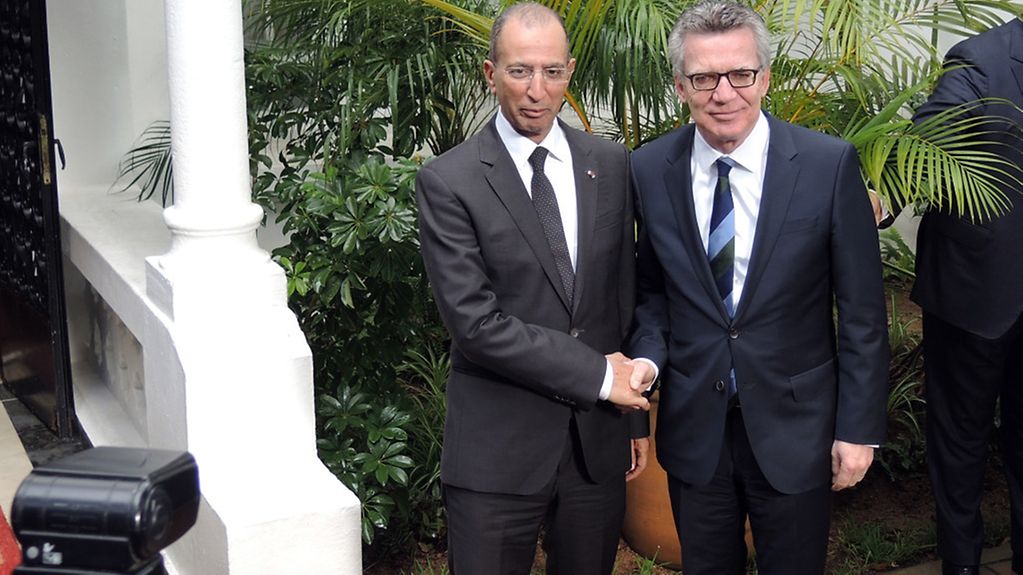Thomas de Maizière in North Africa
On his trip to North Africa, Federal Foreign Minister Thomas de Maizière has been holding talks with representatives of the Maghreb states, Morocco, Algeria and Tunisia, on the return of unsuccessful asylum-seekers. All three states are willing to readmit their citizens.
3 min reading time

In Rabat (Morocco) Thomas de Maizière met with the Moroccan Minister of the Interior Mohamed Hassad
Photo: picture-alliance/dpa/Martin Fischer
In Rabat, Federal Foreign Minister Thomas de Maizière met with his Moroccan counterpart Mohamed Hassad. They agreed on procedures which are to ensure that Moroccan citizens can be returned to their home country more rapidly. The Algerian government is also willing to readmit Algerians who have no prospects of being permitted to stay in Germany.
"The motive for Morocco and Algeria is the high level of interest of both states in cooperating with Germany in the fight against international terrorism," said Thomas de Maizière on German television (ZDF) on 29 February. Algeria and Morocco have welcomed Germany’s intention of declaring both states safe countries of origin, he continued.
The Tunisian government has also signalled its readiness to cooperate with the German government. Within the framework of a pilot project, a first group of 20 Tunisians is to be returned to their home country, reported Thomas de Maizière following talks with the government in Tunis.
Cooperation urgently needed
On 19 January, in an interview with the newspaper Rheinische Post, Thomas de Maizière criticised the Maghreb states’ unwillingness to readmit unsuccessful asylum-seekers. "These countries must realise that, from our point of view, cooperation on migration and readmission is a central factor in our bilateral relations. Our willingness to cooperate in other areas will depend on this."
Algeria, Morocco and Tunisia are to be classed as safe countries of origin. Countries are deemed safe if the legislative is satisfied that there is no political persecution there. Requests for asylum from citizens of such countries are generally rejected, unless special circumstances apply.
More asylum-seekers returned this year
Compared to 2014, a significantly higher number of asylum-seekers were returned in 2015. The figure in 2014 was 13,851. This figure rose to 22,369 in 2015.
In addition, the number of asylum-seekers returning voluntarily has tripled. In 2014 a total of 13,636 people left Germany with the support of returnee programmes. 2015 saw 37,220 people returning voluntarily.
The German government would like to strengthen this trend further, and enhance the readiness of the Maghreb states to cooperate on this point.
Countries required to readmit unsuccessful asylum-seekers under international law
The German government has already concluded a readmission agreement with Algeria and Morocco. No agreement of this sort exists with Tunisia. No bilateral readmission agreement can be concluded with Tunisia because the EU has the primary mandate to negotiate.
Basically, every state is required to readmit its own citizens, even against their will, if they are not recognised as refugees in Germany. This is a responsibility under international law, which is translated into writing in readmission agreements. The readmission agreement regulates procedural matters, including deadlines, costs and points of entry.
On 24 February, at the government press conference, the spokesperson of the Federal Ministry of the Interior, Tobias Plate, explained that the lack of travel documents is one main obstacle to returning unsuccessful asylum-seekers. "Individuals who are to be deported frequently have no identity papers. But many of the countries with which this process does not yet work so smoothly require either a passport or passport substitutes before they are prepared to readmit these people."
A joint initiative of the Federal Foreign Minister and the Federal Minister of the Interior has already managed to persuade the six western Balkan states to accept the so-called "laissez passer" documents issued by the EU, reported Tobias Plate.
The EU-issued laissez passer documents are standard travel documents that allow non-EU citizens who have no travel documents to return to their home countries. They are sometimes referred to as international alternative identity documents.